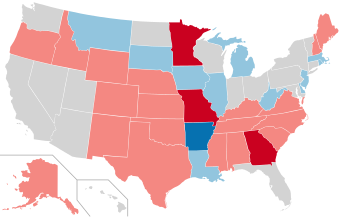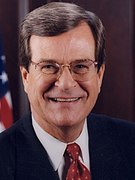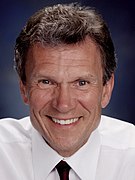| ||||||||||||||||||||||||||||||||||||||||||||||||||||||||||||||||||||||||||
34 of the 100 seats in the United States Senate 51 seats needed for a majority | ||||||||||||||||||||||||||||||||||||||||||||||||||||||||||||||||||||||||||
|---|---|---|---|---|---|---|---|---|---|---|---|---|---|---|---|---|---|---|---|---|---|---|---|---|---|---|---|---|---|---|---|---|---|---|---|---|---|---|---|---|---|---|---|---|---|---|---|---|---|---|---|---|---|---|---|---|---|---|---|---|---|---|---|---|---|---|---|---|---|---|---|---|---|---|
| ||||||||||||||||||||||||||||||||||||||||||||||||||||||||||||||||||||||||||
 Results of the elections: Democratic gain Democratic hold Republican gain Republican hold No election | ||||||||||||||||||||||||||||||||||||||||||||||||||||||||||||||||||||||||||
| ||||||||||||||||||||||||||||||||||||||||||||||||||||||||||||||||||||||||||
The 2002 United States Senate elections featured a series of fiercely contested elections that resulted in a victory for the Republican Party, which gained two seats and thus a narrow majority from the Democratic Party in the United States Senate. The Senate seats up for election, known as class 2 Senate seats, were last up for regular election in 1996. The election cycle was held on November 5, 2002, almost 14 months after the September 11, 2001, attacks.
Going into the election, Democrats had a 51–49 majority due to an Independent that caucused with them, however, this was reduced to a 50–49–1 plurality following the death of Democrat Paul Wellstone and the appointment of a member of the Independence Party of Minnesota in his place. The Democrats had originally hoped to do well, as the party holding the presidency historically loses seats in midterm elections, and additionally, the Republicans had 20 seats up for election compared to 14 Democratic seats up for election. In addition, the Republicans had five open seats, while the Democrats and the Independence Party of Minnesota had one each. However, the Republicans were able to hold their 5 open seats and pick the one that was held by the IPM up, while the Democrats held their only open seat. Republicans also defeated 2 Democratic incumbents, while Democrats defeated 1 Republican incumbent. Together with gains made in the House of Representatives, this election was 1 of 3 mid-term elections in which the party in control of the White House did not lose Congressional seats (the others were 1934 and 1998).
Trent Lott led the Senate Republicans through this election cycle and was due to become the new Senate Majority Leader upon the retaking of control of the Senate by the Republicans. However, his controversial praise for Strom Thurmond's 1948 segregationist Dixiecrat presidential campaign at Thurmond's 100th birthday celebration led to Lott's stepping-down from Senate leadership, and resulted in Tennessee Republican Bill Frist being selected as the new Senate Majority Leader instead.
This was the only election cycle ever where the party of the incumbent president gained new control of a house of Congress in a midterm election. This is also the last midterm election cycle where the party controlling the White House flipped a senate seat in a state they did not win in the preceding presidential election (in this case, Minnesota). As of 2023[update], this was the last Senate election cycle where Republicans won Senate elections in Minnesota, New Mexico, Oregon, and Virginia.
Cite error: There are <ref group=lower-alpha> tags or {{efn}} templates on this page, but the references will not show without a {{reflist|group=lower-alpha}} template or {{notelist}} template (see the help page).

